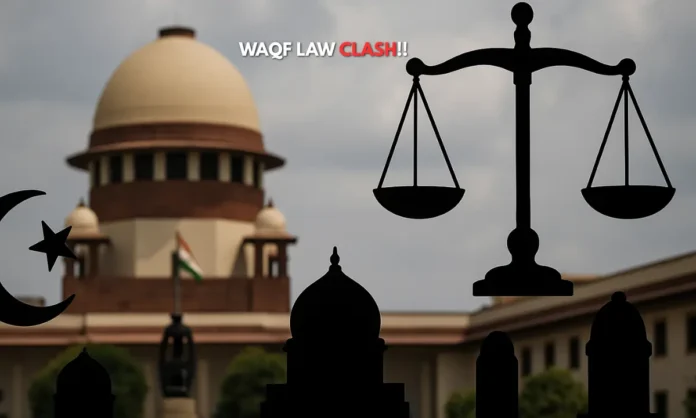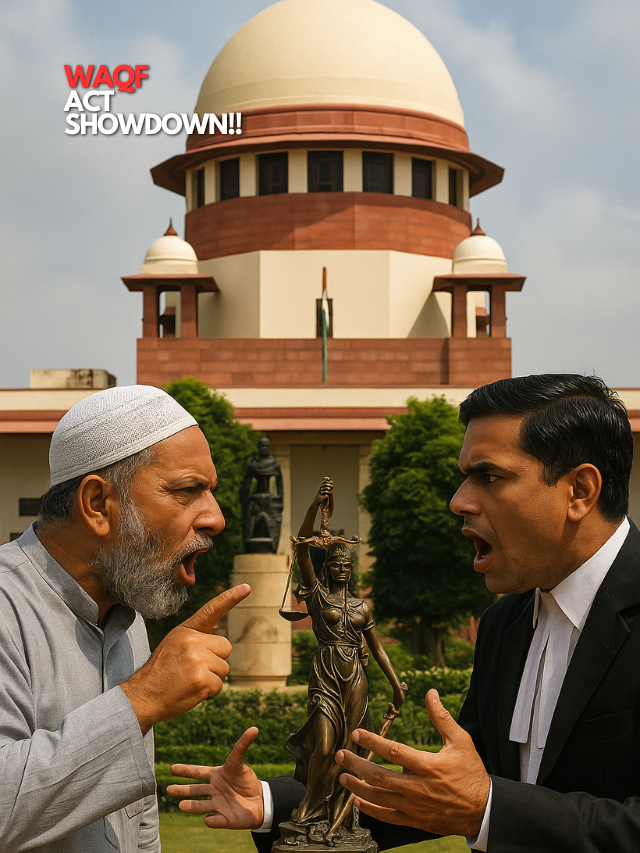Summary
- The Supreme Court has reserved its decision on interim relief against the Waqf (Amendment) Act, 2025, amid fierce debate over religious autonomy and state control.
- Petitioners argue the Act violates constitutional rights, especially with Sections 3C–3E enabling government takeover of waqf lands and barring tribal Muslims from property dedication.
- The Centre defends the law as a secular regulation of administrative aspects, not an infringement on Islam’s core tenets.
A Supreme Court Test for Faith and Federalism
India’s secular fabric was once again under judicial scrutiny as the Waqf (Amendment) Act, 2025 faced a day-long challenge in the Supreme Court. At stake is not merely a property law but a deeper question: Can the state dictate how a religious community manages its endowments, burial grounds, and trusts?
Senior advocates Kapil Sibal, Rajeev Dhavan, Huzefa Ahmadi, and A.M. Singhvi, representing petitioners, argued that the Act represents an unconstitutional encroachment on the rights of Muslims, India’s largest minority. From repealing the long-standing category of “waqf by user” to disqualifying tribal Muslims from dedicating land as waqf, the law has ignited accusations of creeping expropriation and state overreach.
Solicitor General Tushar Mehta, appearing for the Union government, insisted the amendments merely regulate the secular administration of waqf assets. But critics argue that what is being dressed as regulation amounts to dispossession.
Key Arguments by Sr. Adv. Singhvi:
— TVK-WOMEN-WING (@sushmiuma) May 20, 2025
1. Section 3(r) – “Practising Islam” & Bureaucratic Arbitrary Burden:
–> The definition of “Waqf” under Section 3(r) of the Waqf Act requires proof of practising Islam, which is vague, arbitrary, and susceptible to misuse.
–> The… pic.twitter.com/V1MOxaD1EL
Section 3C to 3E: The Most Contested Lines in India’s New Waqf Law
- Section 3C: Suspends waqf status the moment an inquiry begins into whether the land is government-owned.
- Section 3D: Strips waqf property of its status if declared a monument, even if used for religious activity.
- Section 3E: Bars Muslims belonging to Scheduled Tribes and Castes from dedicating land as waqf.
- Petitioners claim these provisions violate Articles 25 and 26 of the Constitution.
- Government argues these are “protective” and prevent misuse or alienation of tribal land.
At the heart of the courtroom clash were Sections 3C, 3D, and 3E—introduced, according to petitioners, bypassing the Joint Parliamentary Committee (JPC). Kapil Sibal labelled Section 3D “smuggled in” on voting day, allowing the Archaeological Survey of India (ASI) to lay claim to centuries-old burial grounds and mosques merely by calling them “monuments.”
Equally controversial is Section 3E, which prevents Muslims from Scheduled Tribes or Castes from creating waqfs. Mr. Mehta called it a safeguard to protect tribal land from predatory encroachments. But Justice Augustine Masih countered sharply: “Islam is Islam. The religion is the same.”
For tribal Muslims, this section draws a line within the community. Critics argue it curtails constitutional protections under Article 25, which guarantees freedom of religion, and Article 26(d), which protects the right of religious denominations to manage their own affairs in matters of religion.
‘Charity Is Not a Crime’: Petitioners Defend Islamic Practices
- Kapil Sibal argued that burial grounds are essential religious sites and cannot be reclassified arbitrarily.
- Dhavan stated waqf is “woven into the religious and social fabric” of the Muslim community.
- Petitioners emphasized that charity (sadaqah and waqf) is one of Islam’s five pillars.
- They contend that non-surveyed waqf properties are unregistered due to state failure—not community fault.
“What is charity for?” Kapil Sibal asked in court. “For the afterlife.” His argument—that charity is an essential religious tenet of Islam—challenged the Centre’s claim that waqf is merely administrative.
Senior Advocate Dhavan reminded the Bench that the Supreme Court had earlier recognized waqf as an institution “close to the heart of the Muslim community.” To now dismiss its essentiality, he argued, was legal convenience masquerading as policy.
Petitioners also tore into the government’s reliance on surveys to determine legitimacy. Sibal pointed out that only one state has conducted a proper waqf survey since 1954. “Now the government blames the community for the state’s failure—and claims unregistered waqfs as its own.”
Waqf and the Constitution: Whose Property, Whose Faith?
This case may well define the contours of religious autonomy in India. If the Waqf (Amendment) Act, 2025 stands unchallenged, it will set a precedent that endangers not only Muslim endowments but all religious trusts. The Centre’s argument—that it is regulating secular aspects, not interfering with essential religious practices—may sound constitutionally sound on paper, but the lived reality on the ground tells a more complex story.
A burial ground used for 100 years being declared government land; a tribal Muslim barred from dedicating land to charity; a mosque losing its waqf status due to lack of registration—these aren’t just legal anomalies. They strike at the soul of a community’s religious and cultural life.
The Supreme Court has reserved its verdict on the interim stay. But the deeper judgment—on pluralism, property, and the limits of state power—is still unfolding.



